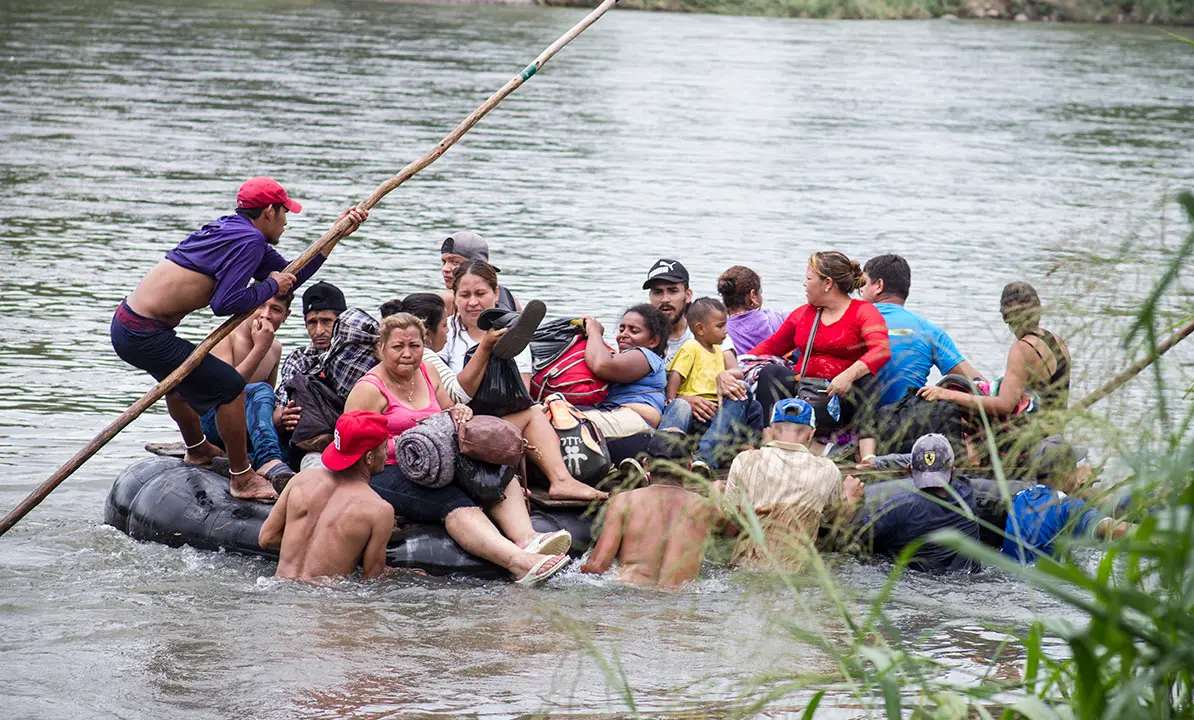Climate change not only destroys territories and ecosystems — it deepens historical inequalities and forces millions of people to move. In Latin America and the Caribbean, where structural poverty, violence, institutional weakness, and gender inequality converge, the climate has become a catalyst for vulnerabilities.
Environmental degradation — from glacial mass loss to heat waves, droughts, or forest fires — is eroding livelihoods and pushing entire communities to migrate to less affected areas. Natural disasters linked to climate change are now one of the main drivers of human displacement in the region: 2.2 million new internal displacements were recorded in 2022 alone, one of the highest figures in the world, according to UNHCR.
The World Bank warns that, without urgent policies, Latin America could have more than 17 million internal climate migrants by 2050, with especially severe impacts in Mexico and Central America.
The gender dimension of this crisis is clear. According to the United Nations Environment Programme, women and girls represent nearly 80% of those displaced by climate-related causes. This “feminization” of climate migration reflects how social norms and structural inequality amplify the effects of environmental deterioration, particularly affecting rural, Indigenous, and Afro-descendant women.
Gender and climate migration: compounded vulnerability
In Latin America, women are often the main providers of water, firewood, and food — tasks that become increasingly difficult as the environment deteriorates. Moreover, the FAO’s The Unjust Climate report reveals that rural women who head households lose more income than men due to extreme heat and floods. If global temperatures rise by just one more degree, those losses could increase by up to 34%, worsening poverty and inequality.
These conditions drive many women to migrate as a survival and resilience strategy. However, during displacement they face sexual violence, labor exploitation, and human trafficking, as well as loss of access to basic services, increasing the risks of maternal mortality and unwanted pregnancies.
Health also suffers the consequences
Extreme heat raises the risk of stillbirths, and rising temperatures favor the spread of diseases such as dengue, malaria, and the Zika virus. According to a study published in The Lancet Regional Health – Americas, young women in Central America and the Caribbean are the most affected. Extreme heat doubles the likelihood of migrating to capital cities in search of work or shelter.
In addition, highly feminized sectors such as textile maquilas or domestic work are among the most vulnerable to these impacts, leading to income loss, forced mobility, and labor precarization. Climate factors also create new — and reinforce old — neglected health determinants, highlighting the need to improve healthcare access and surveillance systems to effectively respond to these crises.
Central America: the mirror of a crisis
The Central American Dry Corridor — spanning Guatemala, Honduras, El Salvador, and Nicaragua — is one of the clearest examples of how climate change affects everyday life. More than 11 million people depend on agriculture, and between 30% and 50% of rural households have lost part or all of their crops in the past five years due to droughts and floods, according to IOM data.
This food insecurity drives thousands of families to migrate northward. In this context, women bear the heaviest burden: staying means enduring scarcity and taking on increased care responsibilities; migrating means facing dangerous routes like the Darién Gap, where high levels of sexual violence have been documented. Between 2016 and 2021, climate disasters displaced 2.3 million children and adolescents in Latin America and the Caribbean, according to UNICEF, increasing women’s caregiving and protection responsibilities both in transit and at destination.
Agents of change: women, territory, and climate justice toward COP30
Despite this panorama, women are not only victims — they are also leaders and agents of change. Across multiple territories in Latin America, rural and Indigenous women lead resilience networks, promoting agroecological practices, reforestation projects, and community water management systems. According to UN Women (2025), these leaderships have been essential for sustaining life and protecting ecosystems, even though their political and economic roles remain largely invisible.
Looking ahead to COP30, to be held in Belém, Brazil, in November 2025, it is essential to recognize and fund the climate leadership of Latin American women. Visibility is not enough: their full and binding participation must be ensured in climate governance mechanisms, and adaptation funds must reach the projects they lead.
Investing in women is not just a matter of justice — it is an effective climate resilience strategy. Where women manage natural resources, soils regenerate faster, crops are more sustainable, and communities show greater social cohesion and food security. COP30 should mark a turning point: moving from seeing women as victims of the climate crisis to recognizing them as protagonists of ecological and social transformation.
Toward a COP30 with climate and gender justice
Brazil, as host of the upcoming COP, has a historic opportunity to place the nexus between gender, migration, and climate change at the heart of global negotiations. This requires: creating international frameworks that recognize people displaced by climate change; ensuring funds go to initiatives led by rural, Indigenous, and displaced women; guaranteeing these women have a voice and vote in climate decision-making; integrating health into climate and migration policies; and creating accountability mechanisms to uphold these principles.
Finally, COP30 must strengthen the principle of shared responsibility and promote a coordinated regional approach that recognizes the interdependence among countries affected by climate change, enhancing regional and multilateral cooperation. Only then can COP30 be remembered as the summit that advanced toward climate justice that is also gender and migration justice.
*Machine translation, proofread by Ricardo Aceves.













